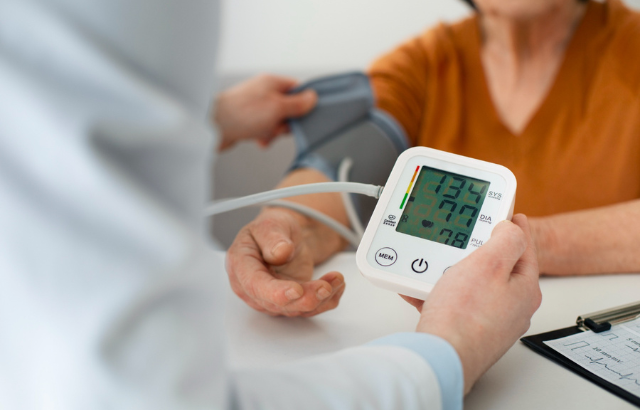Covid-19 had a significant impact on blood pressure recording, but not on blood pressure control
An analysis of GP records for people with hypertension reveals that the pandemic had a major effect on whether or not their blood pressure was recorded, but only a modest effect on whether or not it was controlled.

Checking blood pressure - Image by Freepik
Data from QOF (the Quality and Outcomes Framework - a national incentive programme for GP practices in England) previously suggested that the Covid-19 pandemic dramatically impacted blood pressure control for people with hypertension (persistently high blood pressure). However, QOF assumes that unrecorded blood pressure is uncontrolled, therefore confounding the two measures.
In the analysis, led by the Clinical Effectiveness Group and published in BMJ Open, researchers examined deidentified health record data for more than 224,000 patients in North East London with a current diagnosis of hypertension. They looked at whether patients’ blood pressure had been recorded in the preceding 12 months, whether blood pressure was controlled to the age-adjusted national target, as specified in QOF, and whether patients were being treated with medication for their hypertension. The researchers studied data from January 2019 to October 2022, encompassing the lockdown periods plus one year before and one year after.
Excluding patients without a reading changes the picture significantly
Using all patients with hypertension as a denominator, the proportion who had a blood pressure reading within target dropped by 23 percentage points during the pandemic, from a pre-lockdown peak of 73% to a low of 50%, improving to 60% by the end of the study. This reflects the trend indicated by QOF data. The researchers then ran the analysis excluding patients who did not have a recent blood pressure reading in their patient record. The proportions with successfully controlled blood pressure increased to 81%, 80% and 78% respectively – a maximum drop of just three percentage points. (See Figure 2 from the paper).
The study found there was a large fall in people with hypertension having their blood pressure recorded during the pandemic; from 89% to 62%. This reflects the radical change in the provision of primary care services, including a shift to remote consultations and reduced opportunities for recording of risk factors and optimising management.
The research findings have been replicated in similar studies nationally and highlight the importance of choosing the right metric to understand blood pressure control in a population. People without a reading could have unhealthy blood pressure, so the analysis does not evidence a positive picture of hypertension management. But it does demonstrate that the impact of Covid-19 on blood pressure control was modest, not dramatic as previously thought.
Inequalities in blood pressure control persisted
The researchers also analysed blood pressure control across different patient groups with hypertension. They found that the inequalities that existed before the pandemic persisted throughout and afterwards, but they did not get worse. Throughout the study:
- In comparison to the White ethnic group:
- people in the Black ethnic group were less likely to have blood pressure controlled;
- people in the Asian ethnic group were more likely to have blood pressure controlled.
- Men, younger people, more affluent individuals, people with unknown or unrecorded ethnicity, or those not being treated for their hypertension, were less likely to have blood pressure controlled to target throughout the study.
- People with unknown ethnicity were half as likely as people from the Asian ethnic group to have their blood pressure monitored or controlled, putting them at significant risk. This probably reflects a population unable or unwilling to access health services, putting them at significant risk.
This research was funded by Barts Charity as part of our REAL Health programme, and Health Data Research UK.
More information
- Research paper: COVID-19 pandemic impact on hypertension management in North-East London: an observational cohort study using electronic health records. Stuart Rison, Oliver C Redfern, Rohini Mathur, Isabel Dostal, Chris Carvalho, Zahra Raisi-Estabragh, John Robson. BMJ Open. 2024
- For media enquiries, please contact press@qmul.ac.uk